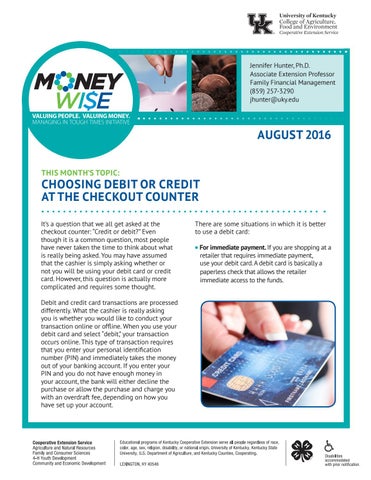Jennifer Hunter, Ph.D. Associate Extension Professor Family Financial Management (859) 257-3290 jhunter@uky.edu
AUGUST 2016
AUGUST 2016 THIS MONTH’S TOPIC:
CHOOSING DEBIT OR CREDIT AT THE CHECKOUT COUNTER
It’s a question that we all get asked at the checkout counter: “Credit or debit?” Even though it is a common question, most people have never taken the time to think about what is really being asked. You may have assumed that the cashier is simply asking whether or not you will be using your debit card or credit card. However, this question is actually more complicated and requires some thought. Debit and credit card transactions are processed differently. What the cashier is really asking you is whether you would like to conduct your transaction online or offline. When you use your debit card and select “debit,” your transaction occurs online. This type of transaction requires that you enter your personal identification number (PIN) and immediately takes the money out of your banking account. If you enter your PIN and you do not have enough money in your account, the bank will either decline the purchase or allow the purchase and charge you with an overdraft fee, depending on how you have set up your account.
There are some situations in which it is better to use a debit card: • For immediate payment. If you are shopping at a retailer that requires immediate payment, use your debit card. A debit card is basically a paperless check that allows the retailer immediate access to the funds.
• Online purchases. If you are shopping online, using your credit card is the safest option. Credit card companies routinely scan these purchases for fraud and will alert you if they believe that your card has been used fraudulently. If you detect fraud yourself, you can dispute the charge and have it reversed fairly quickly.
• When you are on a budget. Many individuals are on a budget. To avoid overspending, some banks will allow for you to set a limit for yourself on your debit card. For example, you can put $200.00 into your checking account and inform the bank that they are not to allow you to go over that limit. You will also want to check that the bank will not charge an overdraft fee. • If you have a hard time controlling your spending. If you find it difficult to control your spending, you will want to avoid using a credit card for the majority of your purchases. Using a debit card allows you to keep track of your expenses in real time. When you use a credit card, or you use a debit card as “credit,” the transaction happens offline and requires a signature. An offline transaction first goes through the credit card company before the merchant receives the funds which can take up to 3 days. Depending on the credit card company that you use, a credit card can offer some anti-fraud protection that a debit card does not. Because credit card transactions often cost the retailer more money, you may notice that certain retailers require a minimum purchase price to use your credit card. As with debit cards, there are some situations in which it is better to use a credit card:
Become a fan of MoneyWi$e on Facebook! Facebook.com/MoneyWise
• Large purchases. Most credit card companies offer warranty protections for large purchases such as household appliances or electronics. Some of these warranties go beyond what is offered by the manufacturer which can be a lifesaver if you find yourself with a defective product. • Travel. If you are traveling, the anti-fraud protection offered by credit card companies is important to pay attention to. Unfortunately, there are many criminals who target unsuspecting tourists by stealing credit card information. With a better idea of the differences between running a transaction as credit or debit, you can make more informed decisions the next time that you are at the checkout counter. You must be sure to choose the transaction option that makes the most sense for you – keeping your financial obligations and spending habits in mind is a great way to make the decision.
Kristyn Jackson, LMFT, Ph.D. Candidate, Department of Family Sciences, University of Kentucky Jennifer Hunter, Ph.D., Associate Extension Professor Family Financial Management, University of Kentucky Cooperative Extension Service, (859) 2573290; jhunter@uky.edu Stock images: 123RF.com
